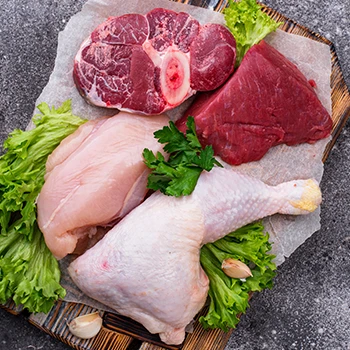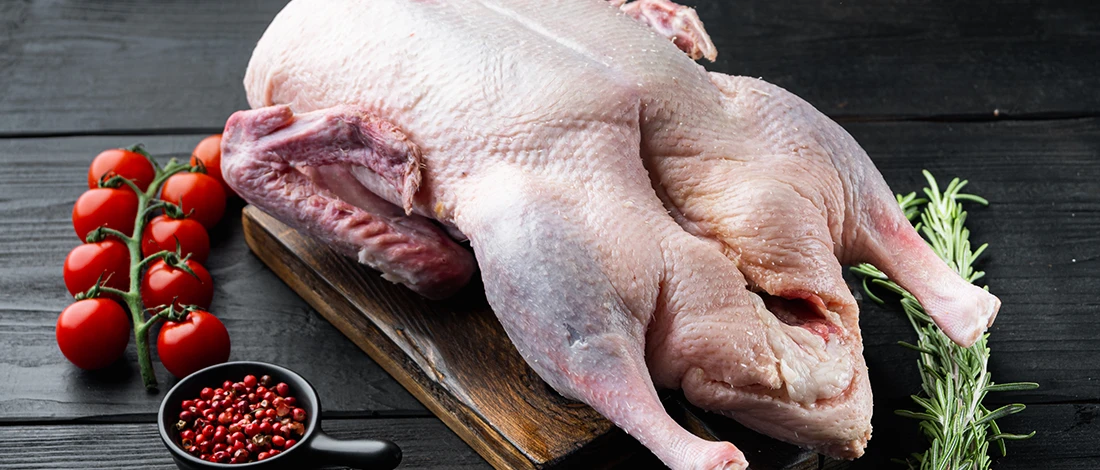Both beef and chicken are widely consumed and have negative associations with diabetes, cardiovascular health, and other health conditions.
With a deep-rooted passion for nutrition and years of dedicated research in the field, I've extensively explored the longstanding debate: Is beef healthier than chicken?
At Carnivore Style, we are committed to helping you make informed decisions about your meat choices based on health and taste.
My investigation involved exhaustive hours of reviewing scientific studies, consulting with nutrition experts, and leveraging my extensive industry experience.
No matter which cut you prefer, find a reliable supplier. Over the past two years, I’ve been ordering meat from ButcherBox, a meat delivery service with a huge variety of grass-fed beef, chicken, and turkey.
In this article, I will delve into four crucial factors regarding health impacts that set beef and chicken apart.
Quick Summary
- Chicken is generally healthier than beef, with fewer calories and less saturated fat.
- Chicken is also a better source of lean protein and is associated with lower heart disease risk.
- Beef, while higher in certain vitamins and minerals, can be linked to higher health risks, including heart disease and diabetes.
CHICKEN VS. BEEF (4 KEY NUTRITION CONTENTS)
In terms of nutritional content, both beef and chicken have their merits. While beef provides essential nutrients like iron and vitamin B12, chicken is lower in saturated fats.
The choice between the two depends on individual dietary preferences and health goals.
Let’s see how the nutritional profiles of these two compare.
1. Calories

Both chicken and beef are high in calories.
100g of cooked beef has 276 calories [1]. 100g of cooked chicken has 165 calories [2]. This means beef has over 40% more calories than chicken.
Chicken meat and ground beef aren’t high in carbohydrates. Chicken, especially skinless chicken breast, has more polyunsaturated fat and fewer saturated fats.
Beef, on the other hand, has more monounsaturated fat, which is slightly healthier than polyunsaturated.
Overall, beef is higher in fats, while chicken is higher in protein. That means chicken meat is the better option for meat consumption in terms of calories.
2. Protein
Both red meat and chicken meat are high in protein, but chicken meat is a better option if you want lean protein with less saturated fat.
Chicken is a better choice if you’re trying to get rid of body fat and achieve a healthy weight or grow muscles.
Chicken breasts are a popular meat for losing weight and can also help build bone density and prevent bone loss because they have a lot of protein. This is especially helpful for elders worried about arthritis and osteoporosis.
“U.S. consumption of poultry meat (broilers, other chicken, and turkey) is considerably higher than beef or pork, but less than total red meat consumption.”
- The U.S. Department of Agriculture (USDA)
However, red meat is also a good source of protein. In fact, if measured by weight, beef has more protein than chicken. Beef also has a lot of creatine, which helps build lean muscle fast.
In terms of protein, chicken is a slightly better option, but you won’t go wrong with red meat. Make sure to avoid processed meats, as unprocessed cuts are richer in protein.
3. Vitamins

Here’s which and how many vitamins you can get by eating chicken and red meat:
- Vitamin A - Beef and chicken have similar amounts of Vitamin A, with chicken having a slightly higher amount.
- Vitamin D - Both beef and chicken have similar amounts of Vitamin D.
- Vitamin E - Beef has 133 μg/ of vitamin E per 100 g on average, and chicken breast has 0.4 mg of Vitamin E per 100 g [3] [4].
- Vitamin K - Beef has 0.85ug of Vitamin K per ounce, while chicken has 2.1μg.
- B Vitamins - Beef has more vitamin B12, and chicken has more vitamins B1, B3, and B5 [5].
4. Minerals
Here’s how red meat and chicken meat differ in the number of minerals:
- Iron - Red meat is a great source of iron. Beef has 2.3 mg of iron per 100 g, and chicken has 0.72 mg of iron [6] [7].
- Calcium - Beef has 30 mg of calcium per serving, while chicken has 11 mg.
- Potassium - Beef and chicken meat have similar amounts of potassium. Beef has 287 mg of potassium, while chicken has 255.
- Omega-3 and omega-6 - Chicken has more linoleic acid than red meat.
Overall, beef wins the mineral competition. Beef consumption will give you more minerals than eating chicken meat.
Related Articles:
Beef vs. Chicken Health Impact

Here are three health aspects of beef and chicken you should consider before opting for one or the other.
1. Heart Health
The American Heart Association says eating chicken meat instead of red meat is better [8]. Beef has more saturated fatty acids and trans fats, which can raise cholesterol and worsen already existing issues.
Moreover, processed red meats have sodium, nitrates, and other byproducts, which can lead to adverse health effects. This is why you should learn about beef production when getting red meat cuts.
Finally, researchers found that heme iron, which is found in beef in large quantities, is another risk for heart health [9]. On the other hand, eating poultry has a smaller risk of cardiovascular diseases [10].
This means chicken poses a risk to heart health, but significantly less than beef consumption.
2. Diabetes

Both red and white meat pose a risk of developing diabetes. Some studies say that people who love eating meat, especially red meats and poultry, are twice as likely to get diabetes compared to people who don’t eat meat [11].
This is mostly because of heme iron, which is especially high in beef.
One way to lower this risk is to choose lean beef and chicken, substitute meat with fish and shellfish, and cook meat at lower temperatures.
3. Cancer Risk
Eating processed meat, especially red, increases the chance of developing cancer [12].
Processed meat especially increases the risk of stomach and esophagus cancer.
On the other hand, poultry leads to a lower risk of cancer. However, one study found that chicken can lead to prostate cancer, especially during high-heat cooking methods [13].
Also Read: What Is the Healthiest Meat to Eat?
CHICKEN OR BEEF BROTH?
Chicken broth, rich in essential amino acids like glycine and proline, may assist in collagen production, promoting healthy skin and joints.
Chicken bone broth is also relatively low in fat and calories, making it a favorable choice for those watching their calorie intake. Additionally, chicken broth may help boost the immune system due to its high content of vitamins and minerals.
On the other hand, beef broth is renowned for its impressive iron content, which is crucial for red blood cell formation and oxygen transportation.
It may also aid in muscle repair and growth due to its protein richness. Moreover, beef broth contains notable amounts of zinc, a mineral vital for immune function and wound healing.
Choosing between chicken and beef broth depends on your health requirements and taste preferences. Both can be part of a balanced diet, contributing essential nutrients your body needs.
BEEF CUTS VS. CHICKEN CUTS
The choice between beef and chicken cuts depends on individual dietary preferences and nutritional goals.
It's important to note that the cooking methods and cuts within each category can significantly impact the nutritional profile.
Trimmed cuts, skinless poultry, and healthy cooking techniques are advised for those looking to maximize the health benefits of either protein source.
ENVIRONMENTAL IMPACT
When comparing beef and chicken in terms of environmental impact, several factors come into play:
1. Carbon Footprint
Beef production tends to have a significantly larger carbon footprint compared to chicken. Cattle emit methane, a potent greenhouse gas, during digestion, and beef cattle often require more feed and resources over their longer lifespans.
In contrast, chickens produce fewer emissions and require less time and resources to reach maturity, making chickens a more environmentally friendly choice from a carbon emissions perspective.
2. Water Usage
Beef production generally consumes more water than chicken. Raising cattle requires substantial water for drinking, feeding crops, and maintaining their overall well-being.
Chicken farming is comparatively more water-efficient, making it a preferable choice in regions with water scarcity concerns.
ETHICAL AND MORAL CONSIDERATION
The ethical and moral aspects of choosing beef and chicken go beyond personal health and environmental concerns.
They encompass broader societal and cultural considerations:
1. Animal Welfare and Treatment
Many people have concerns about the treatment of animals in the meat industry. Beef and chicken production raises ethical questions, but the scale and intensity of issues can differ.
For example, the cramped conditions of some industrial chicken farms may raise concerns about animal welfare. In contrast, beef cattle raised in concentrated animal feeding operations (CAFOs) also face ethical issues related to confinement and treatment.
2. Cultural and Personal Beliefs
Cultural and personal beliefs can heavily influence dietary choices. In some cultures, beef may hold a special significance or be a traditional staple. In contrast, others may prioritize alternatives like chicken diets based on religious or ethical beliefs.
Making informed ethical choices often involves researching the specific sourcing and production methods of the meat you purchase.
Look for certifications like "Certified Humane" or "Organic" that align with your ethical values. Additionally, supporting local and sustainable farmers can contribute to more ethical choices in meat consumption.
FAQs
Why is Chicken Better for You than Beef?
Chicken is better than beef because it's leaner and lower in saturated fats, helping reduce heart disease. Chicken breast is particularly high in protein and contains essential amino acids, aiding muscle growth and repair.
What Meat is Healthier than Chicken?
Meat healthier than chicken includes options like lean turkey and certain cuts of fish. These choices are lower in saturated fats and may assist in maintaining a heart-healthy diet.
Why Can You Eat Raw Beef But not Raw Chicken?
You can eat raw beef but not raw chicken because raw chicken often carries harmful bacteria, such as Salmonella, which can cause severe foodborne illnesses. Beef, when sourced and handled correctly, poses a lower risk of such infections, although it's essential to exercise caution with any raw meat.
At Carnivore Style, we want to ensure you have all the information you need to make the best dietary choices for your health goals. Check out our other guides for more insights into selecting meats that complement your lifestyle, helping you balance both taste and nutrition.
References:
- https://www.fatsecret.com/calories-nutrition/generic/ground-beef
- https://www.fatsecret.com.au/calories-nutrition/generic/chicken
- https://ift.onlinelibrary.wiley.com/doi/10.1111/j.1365-2621.1982.tb
- https://www.eatthismuch.com/food/nutrition/chicken-breast,452/
- https://foodstruct.com/nutrition-search/high-in-vitamin-b-12
- https://www.fatsecret.com/calories-nutrition/generic/chicken-breas
- https://www.heart.org/en/healthy-living/healthy-eating/eat-smart/
- https://www.nhlbi.nih.gov/news/2019/say-what-scientists-claim
- https://jamanetwork.com/journals/jamainternalmedicine/article-abstract/2759737
- https://www.ncbi.nlm.nih.gov/pmc/articles/PMC3942738/1
- https://osher.ucsf.edu/patient-care/integrative-medicine-resources/








